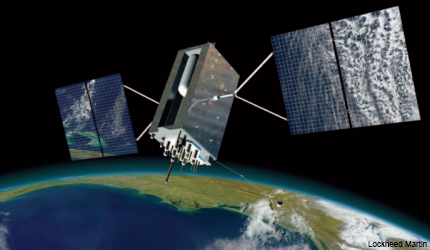Air Force calls Raytheon's GPS control station 'a disaster'
The Space Command's head says GPS III’s operational control system is "embarrassing" to defend, as the service considers reopening parts of the program to competition.

An artist’s conception of a GPS satellite in orbit.
Gen. John Hyten, commander of the Space Command, told reporters this week that the Defense Department plans "significant" changes with Raytheon following a program review last week with Frank Kendall, undersecretary of defense for acquisition, technology and logistics. Raytheon is supplying the operational control system, known as OCX, for the third generation of GPS satellites being built by Lockheed Martin.
Air Force program officials earlier warned of cost overruns on the OCX program along with a possible two-year delay in deploying the ground stations for the new constellation, known as GPS III. They also cited contractor performance issues.
"The OCX program is a disaster, just a disaster, and it’s embarrassing to have to stand in front of people and try to defend it, so I won't," Reuters quoted Hyten as saying during an industry event. He also criticized Raytheon's systems engineering approach prior to writing code for the OCX system.
Kendall reportedly is looking into the possibility of reopening parts of the OCX program to competition.
The GPS III satellite constellation, expected to have a longer life cycle, greater accuracy and better protection from jamming than current satellites, has been slowed by budgets cuts and other problems. The Air Force has been compensating with Boeing-built GPS IIF satellites, the 12th of which is expected to be launched in February 2016, to supplement the 32-satellite GPS II constellation.
As recently as November, Raytheon said it had completed a series of "preliminary launch readiness" milestones designed to demonstrate the maturity of its "cyber-hardened" Launch and Checkout System. LCS includes the cyber "infrastructure for incorporating the remaining OCX mission applications," Raytheon said, adding that testing last summer "represents a significant risk reduction for the overall program."
Air Force officials have nevertheless pointed to growing cybersecurity requirements as one reason for OCX cost overruns and program delays.
Responding to Hyten's criticism, Raytheon said it remained focused on meeting Air Force requirements for the GPS terminals.
"Raytheon is focused on continued development of the modernized, cyber-hardened GPS OCX," Matt Gilligan, Raytheon's vice president for navigation and environmental solutions, said in a statement. "We are fully committed to delivering, without compromise, the modernized GPS ground controls envisioned and required by the Air Force."
The GPS III program, which also will eventually have 32 satellites, has been expected to see it first launch in 2017.




